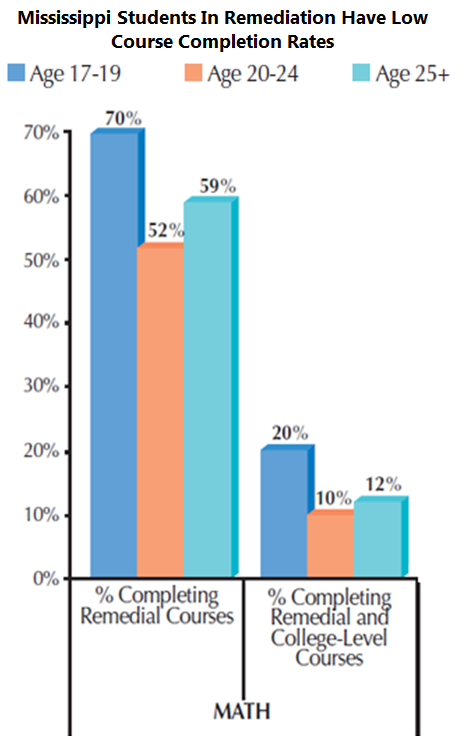School is out for the summer, and thousands of Mississippi’s high school graduates have a few months before heading off to college. In addition to buying text books and selecting a meal plan, entering freshmen will also register for classes. Many of these students will enroll in remedial coursework in reading, English, and math before they take college level courses.
In fact, over 22,000 students at community colleges take remedial courses each year. These classes are an essential gateway to college and a college degree for many students. However, Mississippi’s Senate took the wrong path during the 2013 session by trying to advance legislation that would potentially remove all funding for these programs in the long run.
Instead of removing funding for remedial programs on college campuses, the community college system and state leaders need to be intentional about redesigning and better supporting the courses that serve Mississippi’s least prepared college students.
Why? The portion of students completing a remedial course and then a college-level course in the same subject is very low. The chart shows the percentage of students at Mississippi community colleges that complete their remedial course(s) and then go on to complete a college-level course in math. The blue bar shows that 70% of students age 17 to 19 complete their remedial math courses, but 20% complete college courses in math. Older students –shown in the other two bars- have even lower rates of successfully completing their math course sequences.
The low rates of college-level course completion signal that students are either unprepared for their college courses even after remediation or have obstacles that are leading them to step out of college before completing.
If more students that enter college underprepared are to reach college-readiness and college graduation, it will require strategic changes to the current delivery of remedial programs. Examples of successful programs nationally show us that students experience success when remedial programs adjust their course format, so it isn’t in a traditional, semester-long format. Additionally, changes to the way colleges assess and place entering students into remediation can also ensure that students get the remediation they need and receive more targeted instruction.
A comprehensive plan for improving remedial courses across the state can be found in MEPC’s latest report – Repaving the Road to College Readiness. Ensuring the community college system generates a plan for improving the success of underprepared students is critical to their success and the broader workforce competitiveness of the state. Too many students enroll in college but do not persist to their higher education goals. Making these adjustments can play a critical role in ensuring more students are successful and can access greater economic opportunity.
Source: Remediation, Higher Education’s Bridge to Nowhere. 2012. Complete College America. http://www.completecollege.org/docs/CCA-Remediation-final.pdf
Sarah Welker, MEPC Policy Analyst






